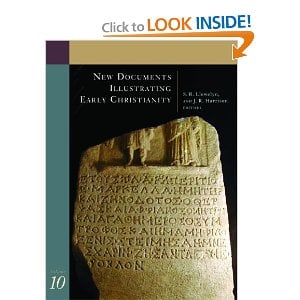One of the things most notable to the student of Biblical literature is the vast increase in the interest in the demonic and the angelic during the inter-testamental and NT eras compared to what we find in the OT itself. But it was not just Jews or Christians who were naming and calling on angels. Pagans did this as well. J.R. Harrison presents us in New Documents Illustrating Early Christianity Vol. 10 with an interesting inscription found on a gem stone, dating to perhaps 150 or so A.D. The inscription reads “Angel Iao may you give success and power and favor and assistance to Asklepiakos with the help of the first angels and the middle angels and final angels throughout his life and bodily protection, Abrasax O Damnameneus forever.”
What we are dealing with here is a magical spell, invoking various grades of angels to protect the wearer of this jewel. We know from the same period that Christians would wear things like, little carved versions of the Lord’s prayer around their neck for protection in travel and good help. The ancients were indeed a superstitious lot, and that includes the Christians. In this case what is interesting is the reference to ranks of angels. We might well compare Paul’s talk about angels and archangels or the various references to angels in the Gospels and in Revelation. It is interesting that on the whole Paul has next to nothing to say about demons, and only passing references to angels. This is in part because the NT is Christologically focused, and it leaves out other lesser middle men between us and God, quite readily. Yet the further we get into Christian history the more other mediators human and angelic creep into Christian piety— Mary, the Saints, various angels and so on. Ancient pagans were quite familiar with the notion of appealing not to the gods directly, who were too scary or busy, but to lesser supernatural or heavenly beings for help.
Harrison is also able to point to the magical papyri (in this case PGM I 300) where Apollo is actually called the first angel of Zeus. Pagans would quite readily add the names of Jewish angels in their syncretistic appeals for help, thus in this same inscription after Apollo is named we hear “and you Michael who rules heaven’s realms, I call and you archangel Gabriel down from Olympos, Abrasax, delighting in dawns, come gracious who views sunset from the dawn, Adonai” (cited on ND Vol. 10 p. 18). In these sorts of cases it is hard to know whether this reflects the prayer of a paganized Jew, or a pagan influenced by Jewish angelology. The point is, there was a lot of cross-fertilization of beliefs in the Diaspora, including in the Pauline cities in the NT era and thereafter.













